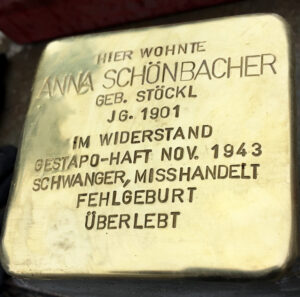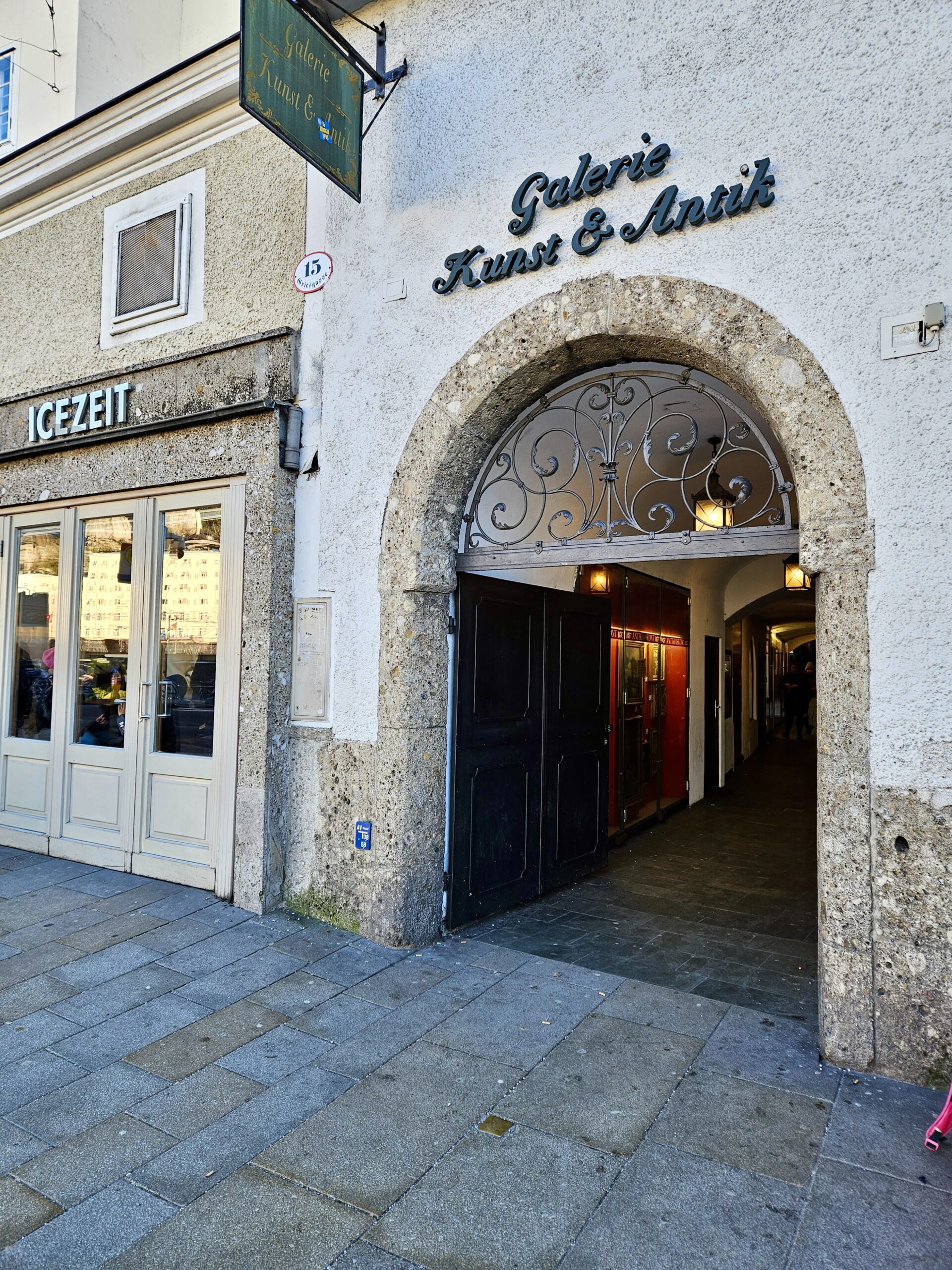Anna SCHÖNBACHER, neé Stöckl, was born in Sankt Michael im Lungau [115 km south of Salzburg] on October 16, 1901. She was baptized Roman Catholic and was working as a farmworker when she married a stable hand named Andreas Schönbacher in Deutschfeistritz, Styria, in April 1933. The couple had a son.
The Schönbacher family moved to Salzburg after the Nazis took over Austria, and starting in August 1939 they lived at 15 Griesgasse.
Their lives together there didn’t last long as Andreas Schönbacher was soon drafted into the German army and only made short visits home when he was grated leave. Nonetheless, Anna managed to become pregnant in 1943.
Anna SCHÖNBACHER was pregnant when her friend Elsa Gamper, who often stayed with her overnights, denounced her for violating the law by listening to BBC London.
On November 24, 1943 Anna was arrested, interrogated and tortured by Georg König (nicknamed »Gestapo-König« the Gestapo King).1 A police report recorded that the pregnant woman suffered a miscarriage with severe bleeding, and that her uterus had to be removed at the hospital. Afterwards she was transferred to the state court jail.
There, this woman, who had no criminal record and didn’t belong to any banned party, was caught up in the gears of political justice. The prosecutors of the so-called »People’s Court« turned the criminal case over to the regional Superior Court in Vienna.
On June 23, 1944 the court’s 7th Senate panel sitting in Salzburg (chaired by Dr. Alois Lindermann) sentenced Anna SCHÖNBACHER to twelve years in prison for »listening to and spreading enemy news reports« and »undermining the military« – a very long sentence for an allegation based only on a denunciation.
Anna SCHÖNBACHER was in the Aichach Bavarian prison when she was informed that her husband had lost his life »for Führer, Volk and Fatherland«. In Mai 1945 she was liberated by US-Troops and was able once more to see her now 10 year old son who had been put in a a children’s home in Salzburg while his mother was in prison.
The two of them left Salzburg in the 1950s and emigrated to Switzerland.
In liberated Austria Frau SCHÖNBACHER was recognized as a political victim of the Nazis and was granted a victims’ compensation pension.
1 From the Salzburger Nachrichten, June 23, 1945, page 1: »Gestapo-König arrested … König was feared above all for the rough way he treated prisoners. To extract confessions, he resorted to terrible tortures and tortures. He kicked them, broke their teeth, strapped them on a bench and beat them. Furthermore, he strangled many prisoners while holding a mirror in front of them. He performed these atrocities in a cellar so that the cries of tortured victims could not be heard. But no criminal can escape the just punishment and that includes König (…)«
Georg König was born in Wien-Alsergrund on September 19, 1913 as the son of a servant girl from Salzburg. In 1933-34 he was arrested twice in Salzburg for Nazi activities before he fled to Nazi Germany. In 1934 his Austrian citizenship was cancelled by the Salzburg authorities, but he returned to Austria as an SS-Untersturmführer (Nr. 188.288) when Austria was annexed to Germany in 1938. He served as a police officer in Lienz East Tyrol until he transferred to the Salzburg Gestapo (led by Dr. Hubert Hueber) in January 1943 where he was the Kriminaloberassistent [superior criminal assistant], responsible, among other things, for the killing of forced laborers, deserters and people who helped escapees. He was arrested near Radstadt in June 1945 and interned in the American Lager Glasenbach (Camp M. W. Orr). He was named on the »first Salzburg war criminals list« and in 1947 he was charged with war crimes by the police headquarters in Salzburg and should have been tried for his crimes. But he was able to escape from a US prison camp (presumably USDIC: US Detailed Interrogation Center in Gmunden) and went into hiding in Germany. He registered in Cologne under a false identity and was arrested there in 1947, but he was only sentenced to nine weeks in prison for escaping internment and forgery – with no further prosecution for war crimes. He was again brought to court in Cologne in 1957: this time he was sentenced to two and a half years imprisonment for extortion and other offenses, but then released because of the time he had been held in investigative custody. In Austria Georg König was never sentenced for war crimes He died in Cologne in 1988 (he is supposed to have committed suicide).
Sources
- Salzburg City and State archives
- Dossier Gestapo-König (by Gernod Fuchs)
- Cologne Nazi-Documentation Center (Dr. Thomas Roth)
Translation: Stan Nadel
Stumbling Stone
Laid 25.09.2019 at Salzburg, Griesgasse 15



